
Transcription
Page 1/8
BTB (as promised)
State of California
California Department of Corrections and Rehabilitation
Adult Institutions, Programs, and Parole
Operations Manual
"Public Safety, Public Service"
Updated Through January 31, 2016
Page 2/8
Article 6-Religious Programs
Revised July 20, 1992
Updated April 5, 2007
101060.1 Policy
The Department shall make a reasonable effort to provide for the religious and spiritual welfare of all interested inmates.
101060.2 Purpose
The purpose of this Section is to provide guidelines for the religious program.
101060.3 Responsibility
Wardens are responsible for the religious programs in the institution and conservation camps. They shall meet quarterly with staff chaplains and Native American Spiritual Leaders.
The Chief Deputy Warden or an AW, shall provide supervision of the staff chaplains, intermittent chaplains, and part-time chaplains.
Staff chaplains shall develop, supervise, and operate their assigned religious programs.
101060.4 Chaplain and Native American Spiritual Leaders' Duties
The pastoral duties of a chaplain and Native American Spiritual Leader shall consist of the following:
-Conducting worship:
-Regular daily and/or weekly worship services, special religious services on religious and national holidays, interfaith services, memorial services, and funeral
services.
-Administering Sacraments:
-Baptism, Confession, Communion, Confirmation, Sacrament of the Sick and Marriage.
-Pastoral visiting:
-Hospital, work programs, visiting areas, housing units, camps, group activities, and families of inmates.
-Religious education:
-Scripture studies, liturgy, history, comparative religion, religious values, contemporary issues, and sacred music.
-Counseling:
-Individual, family, marital, prerelease planning, and other pertinent counseling issues.
101060.4.1 Duties of Chaplain in Case of an Inmate Death
See DOM 51070, Death, for procedures.
101060.4.2 Privileged Communication
Clergy have the right to privileged communication in the performance of their duties to the extent that the information in no way threatens or hinders inmate lives, staff lives, or in any way breaches the security of the facility.
101060.4.3 Ecclesiastical Responsibilities
The Staff chaplain is responsible in his ministry to the source of his ecclesiastical endorsement and to the Wardens. This dual role shall not impose upon the institution a program in conflict with good correctional management.
101060.4.4 Pastoral Duties-Officiating at Marriages
Staff chaplains may officiate at the marriage of inmates. However, the staff chaplain, by virtue of religious affiliation, shall establish the criteria consistent with the provisions of DOM 101070, which shall be met by the candidates, if the staff chaplain is to officiate. Staff chaplains shall provide their supervisors with these criteria. See DOM 101070 for procedures.
101060.4.5 Funerals and Memorial Services
Chaplains and Native American Spiritual Leaders may, with authorization of the Warden, conduct or coordinate funerals and/or memorial services for deceased inmates and/or their families.
101060.4.6 Pastoral Services to Parolees
Staff chaplains and Native American Spiritual Leaders may minister to parolees and their families with the approval of the Warden and the RPA of the P&CSD.
101060.4.7 Pastoral Services to Employees
Staff chaplains and Native American Spiritual Leaders may minister to employees who make personal requests.
101060.4.8 Pastoral Administrative Functions
Staff chaplains and Native American Spiritual Leaders shall be responsible for management of their offices, preparing and submitting reports, incoming and outgoing correspondence, and record keeping. Staff chaplains and Native American Spiritual Leaders shall:
Budget: Be required to submit their budgetary requests in writing through their supervisors.
Facility Emergencies: Be available to assist as required in institutional emergencies as far as the dignity of their office and conscience will permit.
Serve on Various Committees: Staff chaplains and Native American Spiritual Leaders may be called upon to serve on the institution classification committee, be a member of various institution committees, attend institutional staff meetings, and serve on departmental committees or task forces.
Working Hours and Training: They may be required to work irregular hours due to the nature of their profession, attend religious retreats and conferences to maintain ordination and certification status, develop training opportunities for clergy, theological students, and religious volunteers where such programs provide a helpful service to the religious activities of the institution. They are not required to participate in firearm or physical training.
101060.5 Religious Program Activities
The religious programs shall include activities that will encourage inmate participation. The activities may include the following:
-Regular and special religious worship services.
-Special religious observances of the faith group.
-Religious education.
-National commemorative services.
-Interfaith services.
-Meditation services.
-Religious literature distribution.
-Outside religious group participation.
-Self study religious courses.
-Speech forums.
-Service projects.
-Religious interest groups.
-Religious societies and organizations.
-Participation in community betterment programs.
To implement the religious activities program, the Wardens may obtain the following qualified persons:
-Muslim, Jewish, Catholic, Protestant chaplains and a Native American Spiritual Leader on a full-time, part-time, or intermittent basis.
Page 3/8
-Volunteer non-paid community clergy and/or religious or spiritual leader representatives.
-Inmates.
101060.6 Worship Services
Chaplains and Native American Spiritual Leaders shall be responsible for:
-Organizing, scheduling, and conducting the worship services and religious programs appropriate to their faith.
-Approving the scheduling and conducting of worship services and religious programs by volunteer community clergy and volunteer religious representatives.
101060.6.1 Scheduling of Worship Services
Reasonable time for religious services, in keeping with institution security and other normal and necessary operations and activities within the institution, shall be allowed.
Insofar as possible, other institutional activities shall not be planned which will conflict with or disrupt scheduled religious services.
101060.6.2 Inmate Assistant
Inmates may assist in conducting worship services and in the religious programs or as "Sweat Leaders."
101060.6.3 Use of Inmate Ministers
In the event an officially ordained chaplain of a particular faith cannot be obtained to conduct services within the institution for that faith, the Warden may at his/her discretion, and subject to such controls as are reasonably required for institution security, designate a qualified inmate to minister to the religious needs of that particular faith.
In determining the qualifications of an inmate to conduct such services, the Warden shall, wherever possible, seek the advice and counsel of outside religious leaders of that faith.
No inmate shall be assigned as a minister or as a religious counselor on a full-time basis in lieu of regular institution work and program assignment, nor shall any inmate who is approved to minister to the religious needs or interests of other inmates be considered as a state employee or be paid by the state for his or her services.
101060.6.4 Inmate Attendance
Revised October 14, 2009
Inmate attendance in the religious program shall be voluntary. Institution heads shall make every reasonable effort to provide for the religious and spiritual welfare of all interested inmates, including, but not limited to, affording inmates a reasonable accommodation to attend a scheduled Religious Service if they are unable to do so due to conflicting work/education assignments. Reasonable accommodation may include, but is not limited to, modified work schedule, use of accrued time or allowable breaks, granting of a job/assignment change, changes of regular days off, etc. Use of regular accommodation shall in no way adversely impact an inmate's credit earning status. The use of excused time off (ETO) for routine religious services shall be limited to instances where it is not possible to change the conflicting work/education assignment.
For inmates with work assignments outside prison grounds, a reasonable accommodation to attend religious programs shall be limited to an assignment change. Certain assignments may only permit the granting of a job/assignment change as a means of providing reasonable accommodation. This would apply when permitting an inmate to leave the job site is not practical and is unduly burdensome to program operations. Examples include, but are not limited to the following assignments:
-Conservation Camps during the course of firefighting efforts.
-Community Work Crews.
-Other Off Reservation Work Details.
101060.7 Special Religious Services/Programs
Religious services/programs may be conducted in special areas of the institution when an individual or a group of inmates cannot participate or attend the regular institution religious services/programs.
The staff chaplain and Native American Spiritual Leader shall be responsible for establishing religious services and instruction for individual inmates housed in a special housing unit. These services shall be coordinated through the unit captain and approved by the associate Warden.
101060.8 Location and Use of Chapel
Chapel facilities are designated for daily religious uses and programs. Use of the chapels for other than religious activities shall require the approval of the Warden. Wherever feasible, multi-faith chapels or individual chapels for faith groups represented by a substantial number of inmates shall be provided at each facility.
Where only one chapel is available, a schedule for the use of the chapel shall be prepared by the staff chaplains and approved by the Warden or designee. Where chapels are not available, the Warden shall designate a suitable area for the religious services and approve the scheduling of services in such temporary facilities.
Page 4/8
Article 9-Volunteers
Revised February 19, 2009
101090.1 Policy
The Department shall maximize the interaction of varied cultural and socioeconomic members of the community through their use as volunteers.
101090.2 Purpose
This Article establishes objectives, standards, and operational procedures for the participation of volunteers.
101090.3 Definition
Volunteers are persons who provide a service to the Department without expectation or remuneration. Volunteers who provide services on an ongoing basis are called long-term volunteers. Services provided by long-term volunteers are performed under supervision and are subject to performance requirements. Persons who voluntarily perform a service for the Department on a temporary basis, such as to volunteer their talents for an entertainment show or participate in an athletic event, are called short-term volunteers.
101090.4 Objectives
The objectives of the volunteer program are:
-To increase participation in correctional programming.
-To actively encourage inmate/parolee interest and participation in available programs.
-To contribute toward the public's accurate knowledge of the Department's operations.
-To provide a needed interchange between the community and the Department.
101090.5 Responsibility
Hiring Authority
Wardens and RPAs (hiring authority) administer volunteer programs consistent with this policy. The hiring authority:
-Provides appropriate and sufficient numbers of employees for the effective development, coordination, and supervision of volunteer activities and programs.
-Delegates overall responsibility for the Volunteer Programs as follows:
-Institutions: to the CRM or other designated manager.
-DAPO: to the RPA or designee.
-Headquarters: to the Director, or DCP, or designee.
-Recruits new volunteers and develops volunteer/community programs in accordance with identified and prioritized needs of the location.
-Coordinates the screening of prospective volunteers.
-Obtains CI&I SSCH.
-Ensures that no security risks exist.
-Accepts verification of certificates or licenses if professional services are offered.
-Requests the issuance of identification cards for citizen volunteers as authorized by the local institution.
-Ensures that all CDCR Volunteer Identification Cards (VICS) are maintained at the institution's main entrance. Volunteers will be issued a VIC in exchange for their personal identification card when attempting to access their assigned locations. All volunteers will be processed into the institution in accordance with the institution's procedures. Volunteers are required to check in/out of this area, regardless of work assignment locations. Upon exiting the institution, volunteers will surrender the VIC in exchange for their personal identification card.
Page 5/8
-Ensures that the Correctional Captain or Watch Commander maintains an index card file and roster identifying all volunteers, their hours of participation, duties, and area of work.
-Ensures that the Human Resources Office maintains a personnel file to include record of training, duty statement, emergency notifications, TB clearance, and other prescribed information an all volunteers issued a CDCR identification card.
-Develops policy governing job descriptions, recruitment, screening, training responsibility, and the use and supervision of volunteers in conjunction with diverse heads, IST, managers, and sponsors.
-Evaluates the use of volunteers and the volunteer program on a regular basis to ensure:
-Volunteer efforts complement the activities of staff.
-Selected volunteers are physically, mentally, and emotionally able to provide the desired service.
-Compliance with this Article.
-That all volunteers receive an orientation of the Department and their assigned location.
-That incoming inmates and parolees returned to custody are encouraged to participate in the development of volunteer/community programs and are informed of these activities during their initial orientation.
-Posts in conspicuous and accessible areas a current schedule of volunteer services, where available, and a contact person. This information shall be updated at least every six months and as changes occur.
Institution/Division Heads/PAs
-Directly solicit citizen volunteers and community programs to meet needs, coordinating such activity in an institution with the CRM or designated manager.
-Participate in screening, interviews, orientation, evaluation, and approval, of volunteers when requested.
Community Resources Manager
Under the directions of the hiring authority, the CRM shall:
-Provide volunteers with the approved Volunteer Orientation Guide. These guides can be obtained from the Headquarters CRM Administrator.
-Review and approve the use of volunteers or outside resources in any local program when consistent with the goals and objectives of CDCR.
-Supervise the recruitment and training of volunteers.
-Review and approve/deny the CI&I via the CLETS and Automated Visitor Information System (AVIS) clearance for each volunteer.
-Maintain procedures and measures to facilitate the safety and security of volunteers.
-Verify certificates or licenses if professional services are offered.
-Request by memorandum the issuance of CDCR volunteer identification cards.
-Maintain an index card file or roster database identifying each volunteer, including:
-Job Description
-Scheduled work hours
-Telephone number
-Designated assigned area
-Identify the community program volunteers coordinator who will work with the CRM and staff supervisor/sponsor to implement the institution community program.
-Monitor annual evaluation of volunteers and the volunteer programs on a regular basis to ensure:
-Volunteer efforts complement the institution need, inmate activities, and activities of staff.
-Selected volunteers are physically, mentally, and emotionally able to provide the desired service.
-Post information regarding volunteer/community programs in conspicuous and accessible areas. This information shall include a current schedule of volunteer services, where available, and a contact person. This information shall be updated when changes occur.
-Submit a quarterly report to the Director, DCP, which includes:
-Number of volunteers.
-Number of inmates participating.
-Number of hours of volunteer activity.
-Summary of continuous, new, and discontinued programs and special events.
-Evaluation of special events.
-Summary of community contacts.
-Review of procedures/administrative difficulties.
-Notify the Headquarters CRM Administrator in writing within 24 hours of the decision to deny access or termination of a volunteer's services.
-Notify the volunteer in writing within 72 hours of the decision to deny access or termination of their volunteer services.
-Collect VIC's when volunteers service agreement has expired or upon termination of volunteer's services.
Headquarters CRM Administrators
Headquarters CRM Administrators shall:
-Identify program areas where volunteers and community resources are needed.
-Approve in advance duty statements or community program agreements operating within headquarters program area.
-Ensure the number of volunteers and volunteer hours are reported monthly to the DCP.
Human Resources Office
-Arranges for fingerprints and photographs.
-Maintains personnel file for volunteers who receive identification cards.
Local Training Officer
-Provides a minimum of four hours orientation and training to include staff/inmate relations, emergency procedures, IPA, and a tour.
-Infrequent volunteers may be oriented by their supervisor/sponsor with the approval of the CRM/RPA.
Supervisor/Sponsor
-Develops all volunteer duty statements within their program area.
-Determines the specific services the volunteer is to provide and communicates this information to the volunteer.
-Takes action as necessary to ensure that volunteers understand their duties and responsibilities.
-Coordinates or conducts any necessary training so that the volunteer is familiar with CCR and is able to fulfill the requirements of the position.
-Notifies the volunteer of any changes in rules/procedures or in their duties/responsibilities.
-Reviews with the volunteer the Primary Laws, Rules, and Regulations Regarding Conduct and Association with State Prison Inmates, CDCR Form 181, ensures understanding of the material, and answers any questions.
-Supervises all volunteers in the supervisor's program area on a day-to-day basis.
-Maintains attendance records on each volunteer using State time reporting forms showing the number of hours and days worked each month.
-Reports the number of hours and days worked each month to the CRM.
-Records on the timekeeping form the number of inmates participating in each volunteer activity which involves a direct service to inmates.
-Ensures that the volunteer has an approved volunteer identification card or gate clearance. Renews these items when necessary and retains them upon expiration.
-Encourages volunteers to participate in ISR programs and staff meetings.
Volunteer
-Performs the agreed upon service adequately, carefully, and diligently without the expectation of pay or allowances.
-Asks supervisors to explain duties.
-Seeks clarification of unclear items.
Page 6/8
-Agrees in writing to abide by Department rules and regulations, including those pertaining to employee conduct (CCR & 3391-3416 et al.).
-Completes satisfactorily:
-Screening requirements.
-Required forms/photograph/fingerprinting.
-Orientation.
-Verification of possession of credentials/licenses if a professional service is offered.
-Annual evaluation.
-Reports to a higher level supervisor any information which may affect the safety and welfare of volunteers, employees, inmates/parolees, the program, or the community.
101090.6 Appointment Standards
Approval for a volunteer position or a new community program shall be based on:
-Need of service offered.
-Qualifications of individuals offering service.
-Background clearance of individuals participating.
-Time and frequency of services offered.
-Space and employees needed for proper supervision.
New Position Approval
New volunteer positions of programs require the review and approval of the hiring authority before implementation.
Initiating Requests
Requests for volunteer positions are initiated as follows:
-Citizens shall submit a letter to the hiring authority; or
-Sponsor's shall submit a volunteer duty statement or Volunteer Service Agreement, CDCR Form 966, to the appropriate authority:
-Institution program head; or
-PA; or
-Director, DCP.
Requirement of Sponsors
Primary group sponsors shall be full-time employees. Citizen volunteers may be used as co-sponsors under the supervision of full-time employees. Retired departmental staff may be used if they achieved retirement under medical or longevity conditions. Other departmental retirees shall be reviewed and approved by the hiring authority prior to acceptance. Upon approval of the position and selection of a potential volunteer, the sponsor shall escort the individual to the Human Resources Office for completion of required documents and initiation of the screening process.
101090.6.1 Screening
The same general practices, methods, and procedures used to select employees shall be used in screening volunteers.
-Basic educational background and work experience information shall be obtained.
-An interview shall be conducted.
-Credentials/certificate status of volunteers performing professional services shall be verified.
-Tutoring or sponsorship of a craft or hobby program is not considered a professional service.
101090.6.1.1 Relatives and Visitors
Revised April 16, 2013
Inmate relatives and inmate visitors shall not be authorized to volunteer at the same institution in which the inmate is housed. Wardens may approve a volunteer to meet with an inmate during regular visiting hours for the purpose of facilitating specific program services.
101090.6.2 Volunteer Files
A file similar to the official employee personnel file shall be maintained on each volunteer. At a minimum, the file shall include the following forms:
-CDCR Form 181, Primary Laws, Rules, and Regulations Regarding Conduct and Association with State Prison Inmates.
-CDC Form 894, Emergency Notification Information.
-CDCR Form 966, Volunteer Service Agreement.
-CDCR Form 1049, Certification of Volunteer Participation.
-STD Form 261, Authorization to Use Privately Owned Vehicles on State Business.
-STD Form 610-HQ, Health Questionnaire.
-STD Form 689, Oath of Allegiance.
-Statement acknowledging receipt of a copy of the CCRs and the IPA.
A separate record of each volunteer's name, address, and telephone number shall be kept in one of the following:
-Index card file.
-Register.
Unless litigation is pending, these records shall be destroyed as follows:
Index Card
Six months after the last date on which a service was provided by the volunteer.
Register Page
Six months after the last on which a service was provided by any volunteer whose name appears on the page.
101090.6.3 Security Clearance
Prior to appointment, each volunteer shall satisfactorily complete the following security clearance procedures.
-Volunteers issued identification cards:
-A CI&I check shall be processed.
-Fingerprints shall be taken and processed through State DOJ if it is determined by the Investigative Captain to be necessary for a security clearance.
-Volunteers issued gate clearances only:
-A CI&I clearance by CLETS shall be processed. Fingerprints shall not be required under normal circumstances.
Security clearance shall be renewed on an annual basis.
Ex-Felons
Wardens may approve ex-felons to serve as volunteers. Programs can often be enriched by the contributions of ex-felons who share their experiences and personal progress. In addition to the guidelines for training and background investigations, the following steps must be completed before an ex-felon may be approved to serve as a volunteer:
-Documented period of at least three years of crime-free conduct after release or a favorable report upon completion of probation or parole.
-Documentation of current employment of academic status.
-Evidence of discharge from parole and resume.
-Ensure the ex-felon has no family or person with whom the volunteer has had either a personal or business relationship within the institution.
-Ex-felon volunteers shall disclose to the institution head, in writing, if they become aware that a relative or person with whom they have, or have had, a personal or business relationship, has been transferred or committed to the institution where they volunteer. This written disclosure must be provided to the institution head prior to the volunteer returning to the institution. The institution head shall be given sufficient time (at least 30 days) to investigate the nature of the relationship of the ex-felon volunteer with the inmate in order to determine if the ex-felon should be allowed to continue volunteer services at the institution or if restrictions should be placed on the volunteer's access to inmates.
Ex-felons must not be granted waivers from any training or investigative requirements, nor are they to be admitted to Special Housing Units, i.e., Administrative Segregation, Security Housing, Protective Housing, etc. Ex-felons shall not be granted waivers for unescorted status, passes, or volunteer identification cards. Volunteers who are ex-felons shall additionally be required to have the written approval of the Warden prior to admittance for participation in activities or programs.
-If the volunteer is on parole or probation, the written approval of both the caseworker and the hiring authority is required.
-Ex-felons shall not, without the Director's written approval, be assigned to areas which enable them to access any employee records or inmate personal or medical information.
Identification cards
Page 7/8
Volunteers shall be issue identification cards for approved ongoing volunteer activities which will occur on a frequent long-term basis, a minimum of six months, with a frequency of more than one visit per month.
-Those who are involved with only one institution shall be issues a card by the specific Warden.
-Those who are involved with more than one institution and/or function shall be issued cards signed by the Director, DAI.
In institutions, gate clearances issued for each visit are used for individuals or groups providing occasional volunteer services, such as outside ball teams, visiting religious groups, and entertainment groups. (See DOM 31070, Personnel Identification Cards.)
Institutions- Gate Clearance
Gate clearance for outside guests shall be approved by the hiring authority or designee.
-The entrance gate officer shall be provided with a written gate clearance for outside guests.
-All outside guests shall have an identification document with a photograph (i.e., valid driver's license; DMV identification card; or other official, valid, positive identification).
-Guests may be issues a temporary gate pass. They shall be processed through the metal detector and allowed to proceed to their destination with an escort.
-The senior manager on duty (e.g., watch commander, 3rd watch) may suspend prior approval with good cause (e.g., failure to adhere to Department rules/regulations). In such cases, a report explaining the reasons shall be routed to the hiring authority with a copy to the CRM or designated manager.
-An approved volunteer under the age of eighteen years shall be accompanied by CDCR staff and the minor's parent(s)/guardian(s) at all times while inside the institution. The CDCR Form 1887, Parent Consent for Participation, shall be signed by a parent or guardian and notarized. It must be on file prior to participation.
The gate clearance for all volunteers should specify the following:
-Services the volunteer will provide.
-Area(s) of access.
-Assigned work location.
-Days and hours of assignment.
-Escort/ No Escort.
-Authorization, if any, to access institution keys.
101090.7 Volunteer Orientation
Orientation shall be completed prior to assignment as a volunteer.
-Volunteers shall attend the existing orientation offered at the assigned location.
At a minimum, orientation shall consist of:
History
-History and policies of the Department and the assigned location.
-Notification of the provisions of the worker's compensation fund.
Programs
-Overview of the existing programs so that volunteers may develop a sense of their role in relation to other programs, including the work incentive program.
Duties
-Description of the volunteer's duties, lines of communication, supervision, and accountability.
-Public safety shall take precedence over all other considerations in the operation of the programs and activities of the Department.
Service Population
-Review, in general terms, of the needs, attitudes, and lifestyles of the inmate population.
Rules
-Notification that volunteers are subject to the rules and regulations established by the hiring authority and the Secretary.
-Information on the pertinent rules affecting the security of the institution/parole office/unit and the safety of volunteers, employees, and inmates/parolees.
Confidential Information
-Explanation of the IPA provisions.
-The confidentiality of records and other privileged information shall be maintained. (See Information Practices in Section 13030 of this manual). A copy of IPA shall be provided.
-Inform volunteers they may be required to divulge information told in confidence by an inmate/parolee. Explain that only certain confidential relationships are legally recognized, i.e., patient/physician, lawyer/client, husband/wife. Therefore, it is possible that a volunteer may be compelled in a court of law to testify about relevant conversations with inmates/parolees.
101090.8 Volunteer Evaluation
The hiring authority shall evaluate their volunteer programs annually to ensure:
-The volunteer activity complements the activities of employees.
-Volunteers are mentally and emotionally capable of providing the desired service.
-Duties are performed in a satisfactory manner with appropriate staff to supervise.
-Activities are consistent with departmental goals and objectives.
The term of service by volunteers shall be contingent upon satisfactory evaluation by management.
101090.8.1 Volunteer Recognition
Supervisors of volunteers shall periodically recognize exemplary volunteer services and programs in the following ways:
-Submission of a request for a certificate of recognition signed by the Director.
-Preparation of a letter of appreciation for the hiring authority's signature.
Letters and justification for the recognition shall be submitted to the CRM, PA, or division head before submission to the hiring authority.
Wardens, RPAs, and divisions heads are encouraged to prepare press releases in coordination with the CRM for exemplary activities of a volunteer or volunteer program.
101090.9 Termination
The hiring authority may limit or discontinue activities of any volunteer or volunteer group which may impede the security and/or orderly operation of the institution/region.
Criteria
A volunteer or community program shall be terminated if:
-The activity threatens the order and/or security of the program or facility.
-The activity threatens the safety of the volunteer, employees, public, or inmates.
-There is low inmate attendance.
-It is not consistent with the mission and objectives of the institution or office.
-There is no appropriate staff supervisor available.
-Formal evaluation is unsatisfactory.
-The volunteer is physically unable to safely perform required duties.
-There is evidence of volunteer misconduct.
For the purpose of this Article, misconduct shall mean behavior of an improper or unacceptable nature including, but not limited to, the following:
-Acts of inappropriate familiarity with inmates, parolees, or the family and friends or inmates or parolees.
-Inexcusable neglect of specified duties.
-Willful act(s) of insubordination or disobedience.
-Willful and malicious act(s) of discourteous treatment toward other volunteers, employees, inmates, parolees, or members of the general public.
-Act(s) involving the misuse of State property.
-Threat(s) of retaliation against other volunteers, employees, inmates, parolees, or members of the general public.
-Reporting for duty to an institution, facility, or office while under the influence of an intoxicating drug or illegal substance.
-Participating in behavior either on or off duty that is of such a nature that it may cause discredit to CDCR or to the services being provided by volunteers under the volunteer service programs.
Page 8/8
Volunteers or community group members shall receive written notification of their rejection or termination in an expeditious manner.
Volunteer Participation Certification
The CRM or PA shall provide a completed Certification of Volunteer Participation, CDCR Form 1049, with copy to file, to each volunteer annually or upon termination of participation.
101090.10 Volunteer Rights/Privileges
Revised April 16, 2013
Other posts by this author
|
2023 may 31
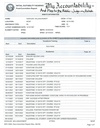
|
2023 apr 5

|
2023 mar 19
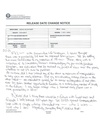
|
2023 mar 5

|
2023 mar 5
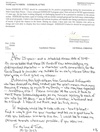
|
2023 mar 5

|
More... |
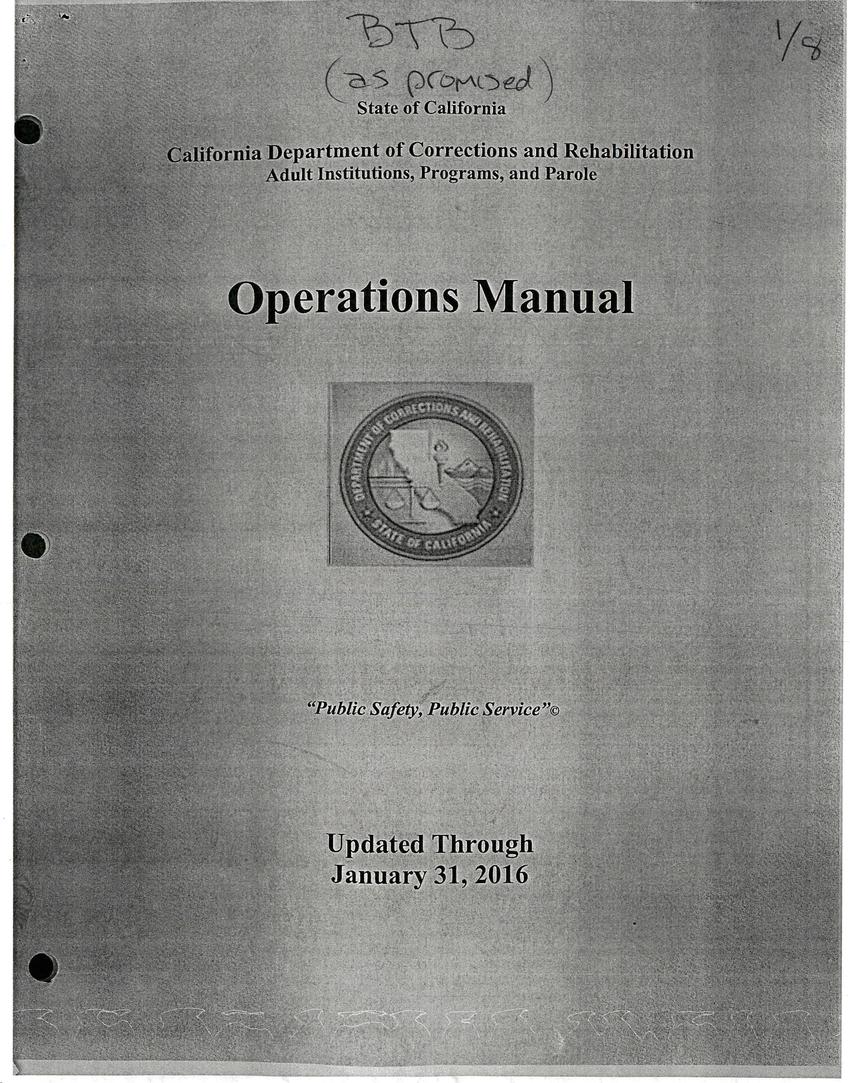
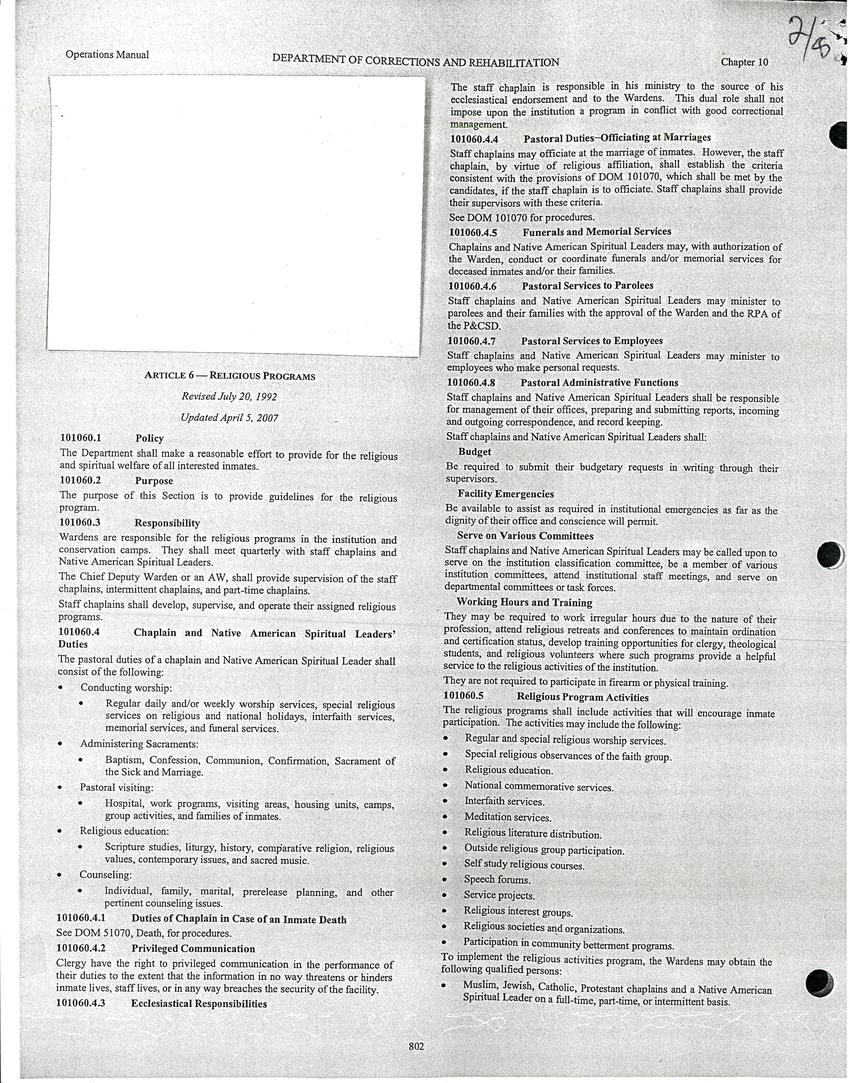
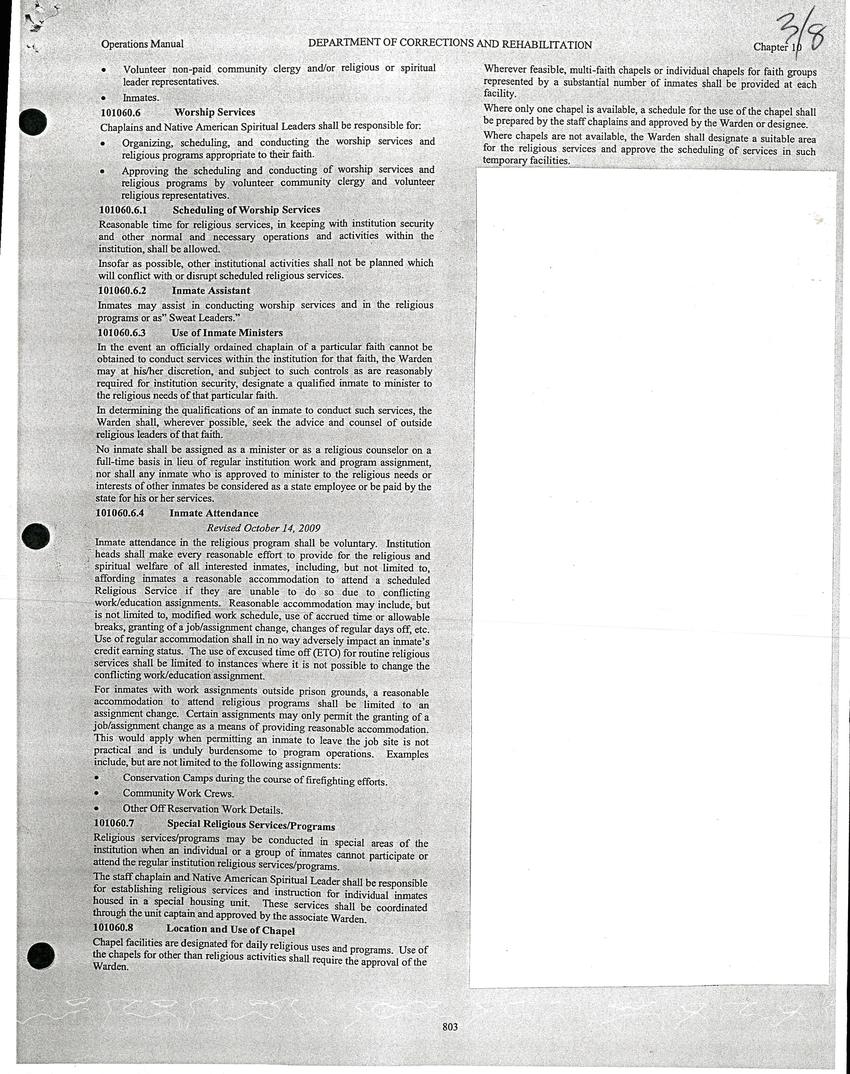
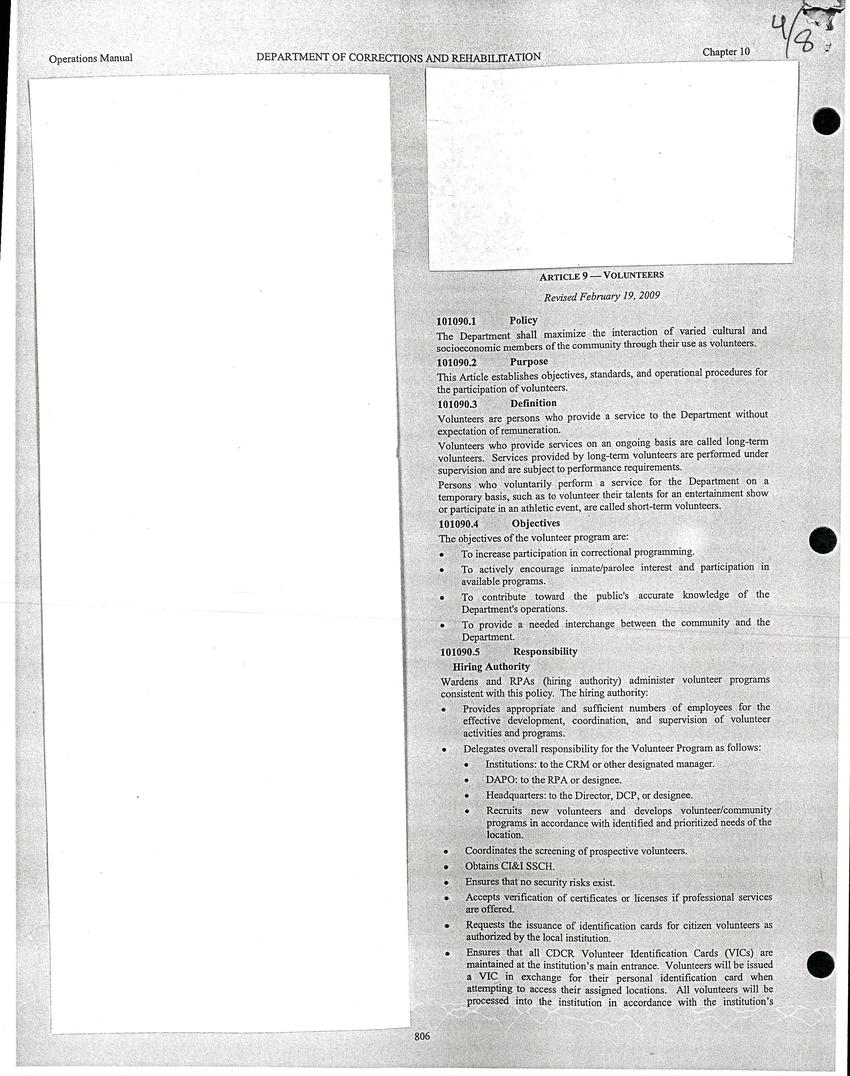
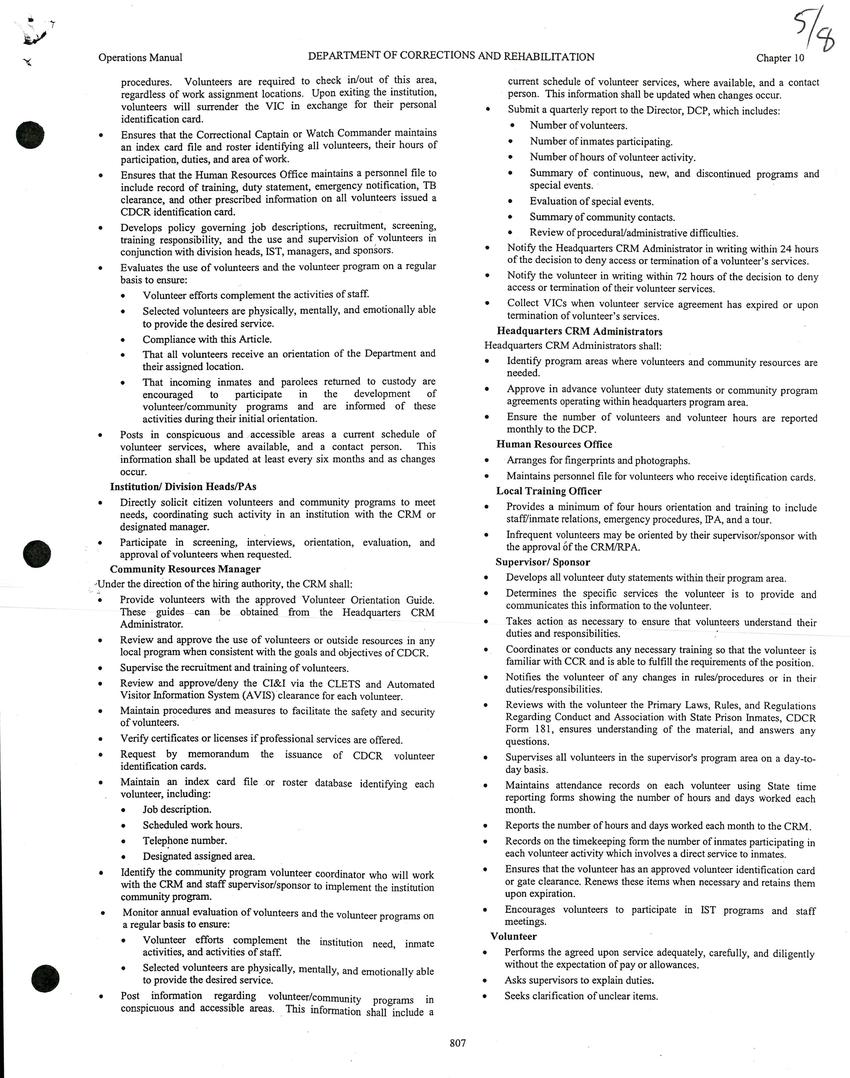
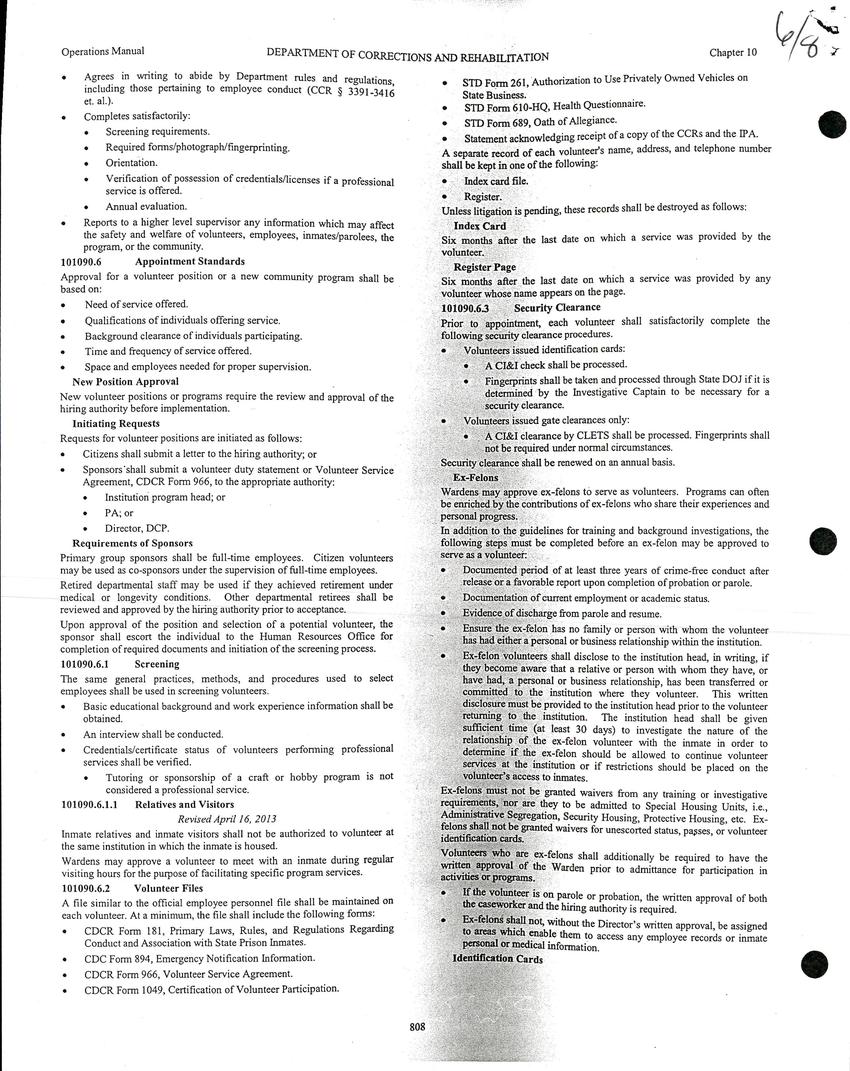
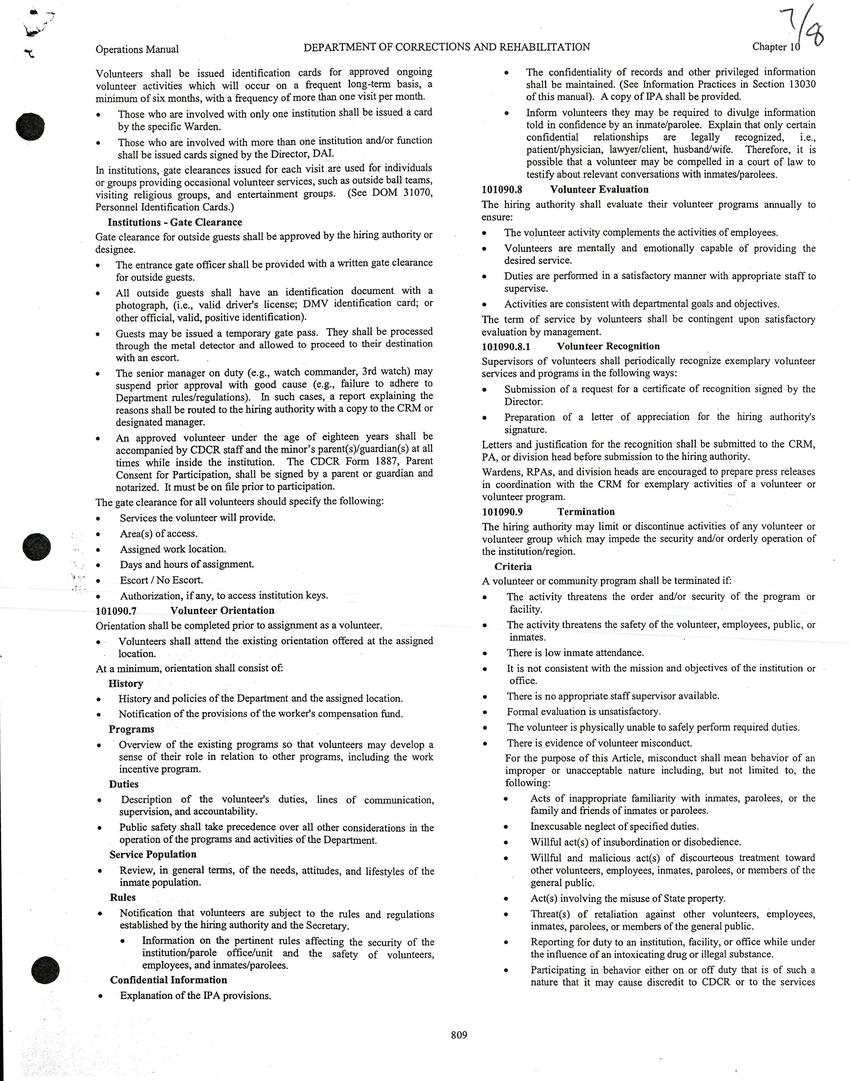

Replies